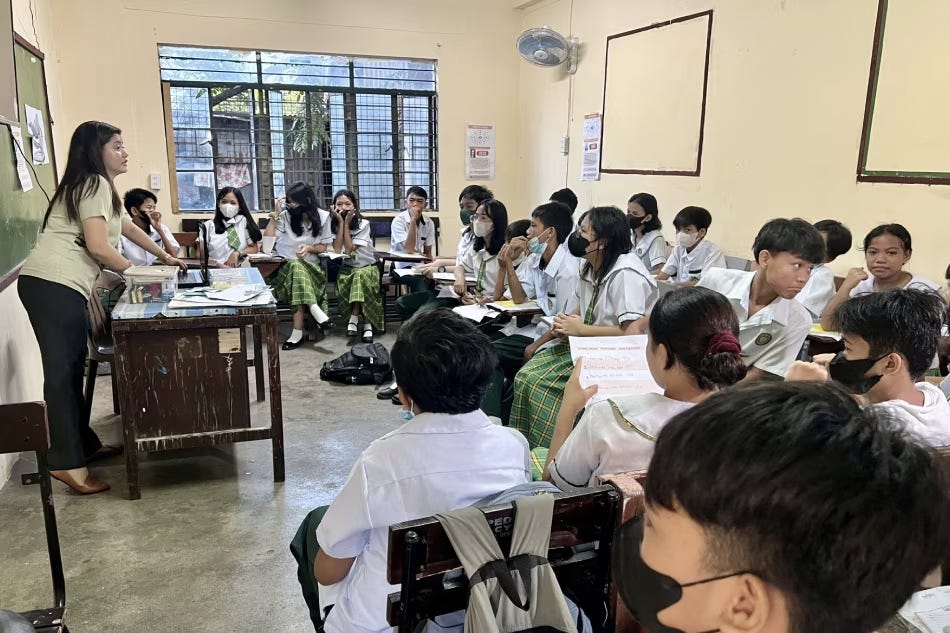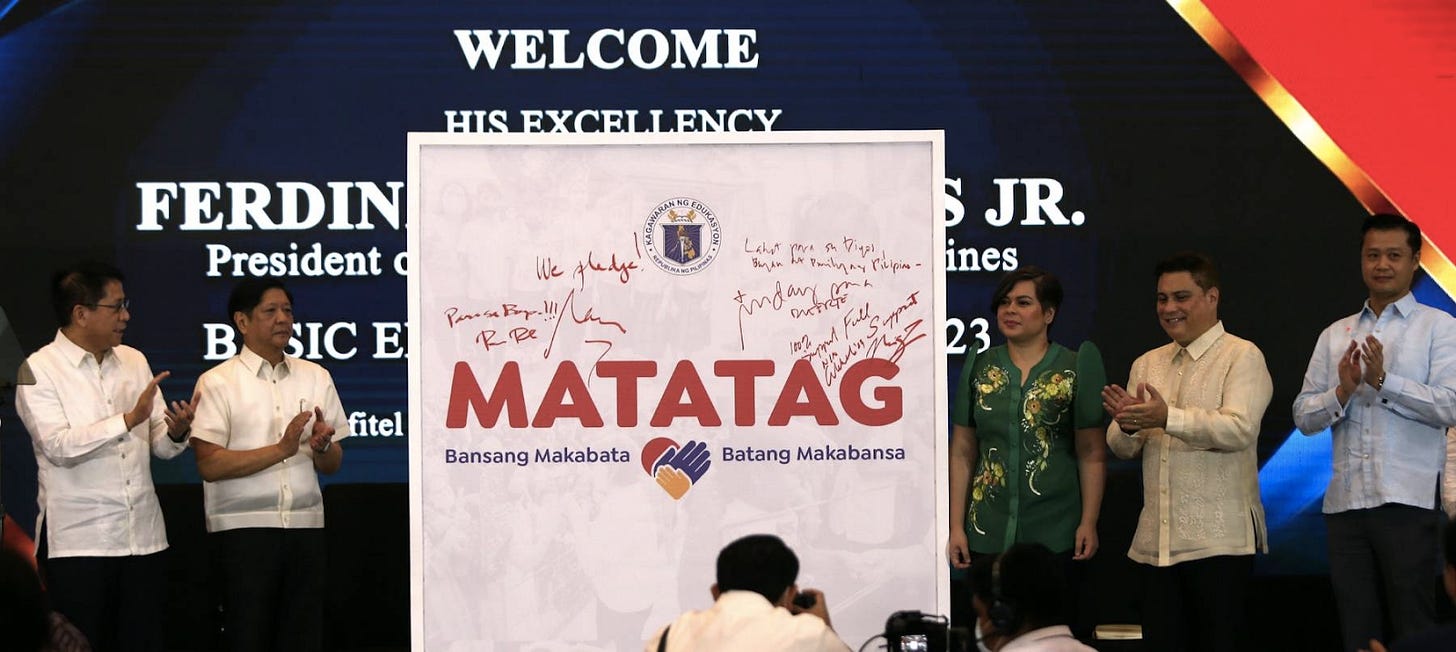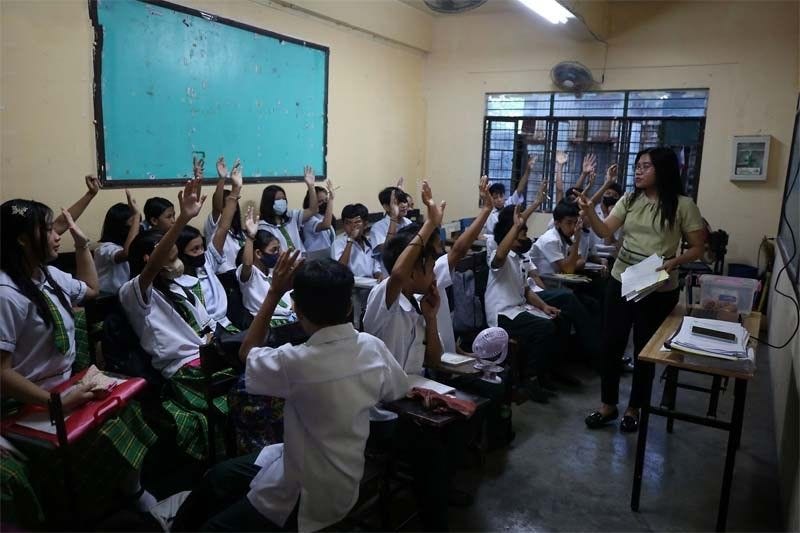Education | Social
Pilot Testing: MATATAG Curriculum
The World, Unveiled.
Written by Kei Hang Derek Chan, Massimo Eviota & Monique Aguilar
October 11, 2023 | Posted on November 15, 2023
After two years of review involving consultations from stakeholders such as teachers, private schools, and higher education institutions, the Department of Education has launched its revised K-10 curriculum. This curriculum, known as MATATAG, has less learning competencies than its predecessor, going from 11,000 competencies to 3,600 – around 70% (“DepEd Rolls out New, Decongested K-10 Curriculum”). DepEd has stated that this will give learners more time to foster their “foundational skills” to produce a better learning outcome, filtering the curriculum down to essential learning competencies.
Pilot implementation of this curriculum has already started in select schools this academic year, with proper implementations starting next year in phases, which are as follows:
Kinder, Grades 1, 4, and 7: SY 2024 - 2025
Grades 2, 5, and 8: SY 2025 - 2026
Grades 3, 6, and 9: SY 2026 - 2027
Grade 10: SY 2027 - 2028
What’s New?
The MATATAG Curriculum is focused on five subjects instead of its predecessor’s six.
The unrevised curriculum focuses on English, Mathematics, Edukasyon sa Pagpapakatao (Humane Education), MAPEH (Music, Arts, Physical Education, and Health), Filipino, and Araling Panlipunan (Social Studies).
Meanwhile, the MATATAG curriculum focuses on Language, Reading and Literacy, Mathematics, Makabansa (Patriotism), and Good Manners and Right Conduct (Macasero).
Mother tongue as a subject is to be removed from the curriculum, though it is to be incorporated into other subjects. Vice President Sara Duterte says that the new curriculum will also integrate peace competencies, intended to develop conflict resolution skills in learners.
The previous curriculum’s biggest fault, according to a conducted two-year long review, was its overloading. Lesson contents were filled to the brim, delegating a heavy burden to instructors and students, with the latter unable to fully master fundamental skills. Decongesting the curriculum was the best solution to this (Macasero).
MATATAG Curriculum to Compete with International Curricula
With the introduction of this new “MATATAG Curriculum” to Philippine education, both President Ferdinand “Bongbong” Marcos Jr. and Vice President Sara Duterte firmly believe that this curriculum will be able to provide for the needs of Filipino children according to what local and international experts believe should be addressed. One such aspect that the curriculum focuses on are STEM subjects, with Sara Duterte—who also is the current Secretary of the Department of Education—being convinced that this will let students “be competitive in the global market” and “get the best jobs and contribute to our country’s development” (Piatos). This is supplemented with the meaning behind the word ‘matatag’ for the new curriculum, relating to producing job-ready, active, and responsible citizens; accelerating the delivery of basic education services and provision facilities; promoting learner well-being, inclusiveness learning, and a positive learning environment; and giving support for teachers to teach better.
It is clear that this new curriculum aims to improve the education of Filipino children, especially the younger ones. Moreover, working with less subjects can help students focus more on more important aspects that can potentially lead to higher proficiency in critical areas of education.
However, concerns have been raised towards the implementation of this curriculum, with arguments being the strain of introducing a new curriculum which requires plentiful resources and meticulous planning, together with the way that focusing on certain subjects in the early stages of a student’s education will neglect other subjects that have just as much importance. In turn this will prevent the formation of a holistic education for students.
The Inaugural Implementation
The Department of Education (DepEd) Assistant Secretary Francis Cesar Bringas had given news regarding the inaugural implementation of the MATATAG Curriculum in select schools in the Philippines on September 25, 2023. To prepare, teachers conducted capacity-building activities and orientation sessions before the start of the program for a smooth transition with the use of a new curriculum (Hernando-Malipot). Even then, adjustments have been made regarding specific learning areas mostly due in part to the ongoing and enhancement process throughout the duration of the pilot testing phase.
For 35 schools across seven regions, the pilot testing was conducted in regions that include Ilocos, Cagayan Valley, Central Visayas, Soccsksargen, Cordillera Administrative Region, Caraga, and the National Capital Region (Hernando-Malipot). This is all part of a plan for the full nationwide implementation of the MATATAG Curriculum which starts in the 2024-2025 school year. Various grade levels such as Kindergarten, Grades 1, 4, and 7, will begin using the MATATAG Curriculum in the aforementioned school year, whereas Grade 10 would be the final grade level to implement this curriculum in the 2027-2028 school year.
With this in mind, a key feature that this curriculum possesses is the reduction of learning competencies from 11,000 down to 3,000 to place emphasis on essential skills and knowledge that is needed for a student (Piatos). Furthermore, from Grades 1 to 3, the number of subjects are reduced from seven to five, with Math and Reading being the main focus for these grade levels. Meanwhile, subjects such as Science will be introduced in Grade 4.
Initial Feedback
Pilot implementation of the new curriculum has received generally positive responses (Bacelonia). DepEd spokesperson Undersecretary Francis Cesar Bringas stated that teachers and learners were receptive to the new curriculum. At the moment, some adjustments are being made to class programs to address changes in the time allocations for some learning areas.
Despite the positive feedback coming from this pilot testing, concerns have been raised on the feasibility of the implementation of the new curriculum throughout the entire Philippines. The limited range of schools covered by the pilot testing coupled with the limited amount of time to prepare has can lead to a lack of proper training and allocation of resources to teachers and students who both are facing a brand new curriculum for the very first time.
There have been many calls for disagreement against the new curriculum, most notably by the Alliance of Concerned Teachers (ACT). The group’s secretary general, Raymond Basilio, criticised the MATATAG curriculum for the lack of comprehensive democratic consultation with some stakeholders such as parents, students, and teachers (Rita). According to Basilio, a genuine democratic consultation is necessary to ensure that plans align with the needs and interests of the Filipino youth. ACT further stated that the new curriculum leaves the issue of the “top-down approach” by the previous curriculum unaddressed, saying that the decisions primarily benefit the business sector.
Future of Philippine Education
The MATATAG curriculum aims to focus on “key competencies and foundational skills” of students, as learning poverty rates are at 90.9%, and 90.4% of them were unable to achieve minimum proficiencies after preschool (Mendoza). A decongested curriculum would therefore allegedly benefit students by focusing on essential skills. Proponents argue that the new curriculum would grant the much-needed additional time for students and teachers. Not only does this increase the chances for both students and teachers to learn and teach, but teachers would also have the time to make more contact with learners who may need assistance. The skills selected may prove more relevant as well, as VP Sara states that children under this curriculum would “improve their knowledge, enhance their skills and talents, and prepare them to become well-rounded, mature individuals.”
On the other hand, the ACT argues that the MATATAG curriculum should be stopped, pushing for consultations with education stakeholders for “a relevant and responsive curriculum” (Servallos). ACT said that the implementation was premature and would put students and teachers to another experimental educational scheme that is as problematic as K-12. Their major points of contention include how the curriculum’s “benchmarking of the 21st-century skills development” is aligned to foreign demand instead of the constitutional mandate for an education system relevant to the needs of Philippine society and its people. A revised curriculum must be responsive to the local issues such as food security, development, and basic national industries, producing graduates that contribute to nation-building instead.
Closing Remarks
As Filipino citizens, we deserve a say in how learning curriculums should be revised and implemented. Working towards a better learning environment for the youth and succeeding generations entails ensuring that curricula not only adapt to the mistakes made by predecessors but also tackle the constantly changing landscape of modern global society.
Therefore, this poses the question:
Will the MATATAG Curriculum justify the revisions made by showcasing students with a truly well-rounded education?
Or
Will the changes turn out to be regressive and further delay the educational maturity of the Philippine youth?
Edited by Sofia Giulia Diño, Riana De Leon, Samantha Tan
Research by Patricia Nicole Tan, Katherine Anne Jacob & Marco Macalintal
WORKS CITED:
Bacelonia, Wilnard. “DepEd: Teachers, Learners “Receptive” to MATATAG Curriculum.” Philippine News Agency, 26 Sept. 2023, www.pna.gov.ph/articles/1210540.
CNN Philippines Staff. “DepEd Rolls out New, Decongested K-10 Curriculum.” Cnn, 11 Aug. 2023, www.cnnphilippines.com/news/2023/8/11/deped-revised-k-10-curriculum.html.
Hernando-Malipot, Merlina. “DepEd Gears up for the Pilot Run of MATATAG Curriculum to Start on Sept. 25.” Manila Bulletin, 24 Sept. 2023, mb.com.ph/2023/9/’)dfb@(98991*97996)xca/dep-ed-gears-up-for-the-pilot-run-of-matatag-curriculum-to-start-on-sept-25.
Macasero, Ryan. “New K-10 Curriculum in the Philippines: What You Need to Know.” RAPPLER, 11 Aug. 2023, www.rappler.com/nation/deped-k-10-curriculum-philippines-things-to-know/.
Mendoza, Red. “Matatag Curriculum: Solution to PH Education Woes?” The Manila Times, 11 Oct. 2023, www.manilatimes.net/2023/10/11/tmt-anniversary/matatag-curriculum-solution-to-ph-education-woes/1913944.
Rita, Joviland. “Teachers’ Group Opposes Implementation of Matatag K-10 Curriculum.” GMA News Online, 8 Sept. 2023, www.gmanetwork.com/news/topstories/nation/881567/teachers-group-oppose-implementation-of-matatag-k-10-curriculum/story/.
Servallos, Neil Jayson. “Teachers’ Group Wants MATATAG Curriculum Implementation Stopped.” Philstar.com, 26 Sept. 2023, www.philstar.com/headlines/2023/09/26/2299031/teachers-group-wants-matatag-curriculum-implementation-stopped.
Tiziana Celine Piatos. “Game-Changer? “Matatag Curriculum” Aims to Fix Educational Woes.” Daily Tribune, 14 Aug. 2023, tribune.net.ph/2023/08/14/game-changer-matatag-curriculum-aims-to-fix-educational-woes/






